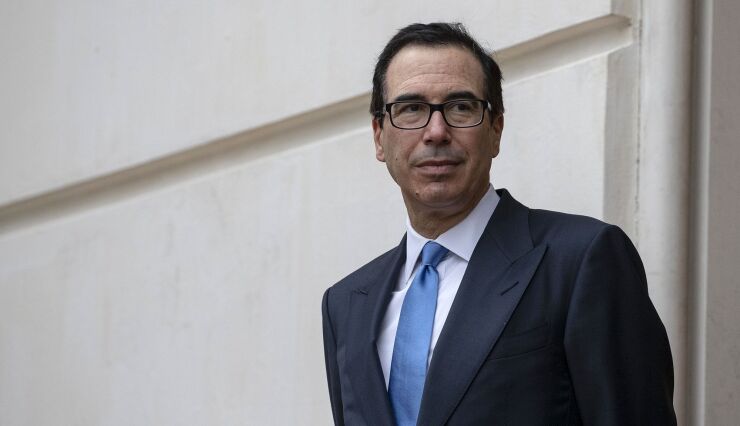The Trump administration hasn’t committed yet to index capital gains to inflation, Treasury Secretary Steven Mnuchin said, even as White House officials continue to pursue the plan for a tax break that would largely benefit the wealthy.
“Right now there’s no commitment to getting it done or not getting it done,” Mnuchin said in an interview Thursday in Chantilly, France, where he was meeting with Group of Seven counterparts. “It’s a policy that has been under consideration and remains under consideration.”
Mnuchin’s ambivalence suggests a divide between Treasury and the White House, where officials are working rapidly to deliver the tax cut ahead of the 2020 election, possibly while bypassing Congress, according to a person familiar with the matter.

The change would likely come in the form of an executive order as soon as September, according to the person, who requested not to be identified because the discussions aren’t public.
Revamping capital gains taxes without congressional approval would likely prompt legal challenges, a concern that reportedly caused President George H.W. Bush’s administration to drop a similar effort. The prospect of a legal battle is of particular concern at Treasury, according to the person.
Indexing capital gains to inflation would slash tax bills for investors when selling assets such as stock or real estate. The change would adjust the original purchase price so no tax is paid on appreciation tied to inflation.
Senate Interest
Senator Ted Cruz, a Texas Republican, is planning to send a letter to Mnuchin urging him to give the same treatment to capital gains as individual income brackets, which are adjusted annually for inflation.
The current rules “punish taxpayers for the mere existence of inflation and is inherently unfair,” according to a draft of the letter addressed to Mnuchin and signed by Cruz. The senator, who cited a study saying the change would bolster the economy, will ask colleagues to sign the letter.
“Any decrease in the effective tax rate on capital gains incentivizes investors to realize gains on their investments, which opens up those dollars to new, more efficient allocations,” Cruz wrote.
But Senate Democrats are pushing back against the administration’s plans.
“We urge you to reject reported plans to use questionable authority to — yet again — lavish tax cuts upon our country’s wealthiest, while middle class families and working people continue to see costs rise and wages stagnate,” Senators Sherrod Brown of Ohio and Ron Wyden of Oregon said in a letter to Mnuchin earlier this month. Nearly a dozen Democrats signed it.
The top 1 percent of households by income would receive 86 percent of the benefit from the change, according to estimates in 2018 by the Penn Wharton Budget Model. The policy may reduce federal tax revenue by $102 billion over a decade, the model found.





